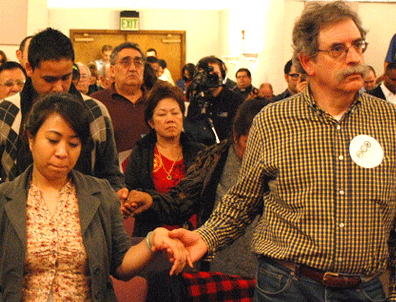
Faith groups escalate campaign against Bank of America
Religious and community leaders from around the Bay Area held a public negotiation session last week with Bank of America executives and local homeowners frustrated by the pace of home loan modifications. With more than fifty witnesses from non-profit groups and local and state governments observing, the delegation demanded that the bank employ new policies to
swiftly increase its number of loan modifications for qualified borrowers. In the end, the negotiations did not satisfy the delegation, which included all members of the PICO National Network, an alliance of 1,000 faith congregations."Bank of America had nothing - no new ideas or proposals to offer to keep families in their homes and end the suffering in our communities," said Rev. Lucy Kolin, from Oakland Community Organizations and PICO National Network, who led the negotiation session. "We went into this meeting willing to be hopeful, but we were disappointed."
According to a news release issued by PICO, Bank of America services the loans of more than one million families who are potentially eligible for loan modifications (one third of all eligible homeowners), yet after nine months of participation in the HAMP (Home Affordable Modification Program), Bank of America has offered permanent modifications to just 3,183 homeowners.
“I have been waiting for a loan modification from Bank of America for more than 8 months now,” said homeowner Mercy Martinez. “Bank of America waits months to respond to me and then tells me to re-submit all my paperwork and gives me a week to do so. I still don’t know if I’ll be able to stay in my home.”
Anna Tellez, a member of the pastoral council at St. Ignatius Catholic Church in Antioch that decided last month to divest from Bank of America, told the crowd at the meeting, "Members of our parish, members of communities, are losing their homes. Meanwhile, Bank of America has made less than 100 permanent loan modifications nationwide.”
As well-intentioned the delegation’s efforts may be, there is no lack of criticism of HAMP from many politicians and economists who say the program hurts both homeowners and financial institutions. A recent article on MSN Money points out that borrowers themselves are part of the problem, often providing inaccurate and incomplete information. John Courson, the CEO of the Mortgage Bankers Association, says more than 60% of borrowers in trial modifications have failed to submit accurate, or any, documentation to servicers.
Programs such as Making Home Affordable only stall the inevitable, critics say, by helping people afford their homes now when they likely won't be able to in the future. "(The program) is being overwhelmed by the magnitude of the problem," Moody's Economy.com's chief economist, Mark Zandi, says.
Critics of the program also say that as home values decrease, owners may find themselves stuck paying for a loan worth less than the value of the home, rather than just going through foreclosure.
At the meeting led by PICO, Anna Tellez urged other faith organizations to divest their funds from Bank of America, which is the group’s response to the bank’s failure to meet their demands.
"We are moving forward on our campaign to get our families, our congregations, our denominations, our local and state governments, and other institutions to divest from Bank of America," announced Gina Gates, a PICO leader.
The PICO network says it is focused on stopping preventable foreclosures, namely those qualified buyers should be able to avoid. As the definition of ‘qualified buyers’ shifts with lending policies, the group demands that Bank of America provide more transparency and do affordable, long-term loan modifications.
At the time of publication, representatives from Bank of America had not responded to Vision Hispana’s request for comment.

